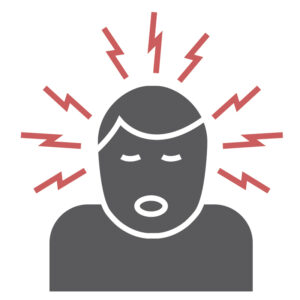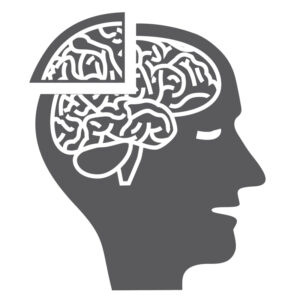Concussion Management & Vestibular Therapy
Concussion Management
Concussion Treatment Has Evolved.
There was a time when early concussion treatment was centered around resting in a quiet, dark room, in order to avoid any stimulus. However, this is no longer the case, as recent studies show that just like our muscles, our brains need to be exercised after injury to get them back working optimally. Rest more than 48 hours after injury is no longer recommended, and skilled physical therapy has been shown to be essential to decrease concussion symptoms and restore normal function of the ocular, vestibular, cognitive, and musculoskeletal systems post injury.
Concussion results in an array of symptoms including visual, vestibular, cognitive, headache and dizziness components. Treatment sessions may include vision exercises, vestibular habituation exercises, manual therapy and or strengthening of the cervical spine, balance and functional exercises.
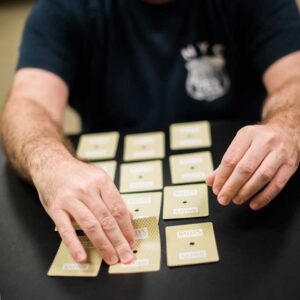
The Physical Therapists at Atlantic Physical Therapy Center specialize in working with individuals who exhibit ongoing concussion symptoms as well as coordinating with other concussion management physicians, and school athletic trainers, to help them receive the best care possible and return them to their regular activities as quickly and safely as possible.
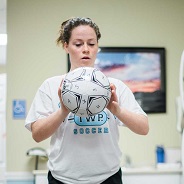
Concussion Symptoms:
- headaches
- blurred/double vision
- fatigue
- loss of concentration
- sensitivity to light/noise
- nausea/vomiting
- ringing in the ears
- slurred/slow speech
- increased clumsiness
- dizziness
Athletes/Return to Sport: An important component of the concussion program is exertion testing and progression of an athlete’s tolerance of exercise following concussion. Often the athlete is advised to avoid activity for an initial healing period and must be guided by a professional to allow progressive return to his or her sport at the appropriate time. Specialized exertion testing and graded progression of exercise tolerance helps take the guesswork out of determining when an athlete is ready to return to sport safely.
NeckCare available at the Jackson Location
NeckCare provides an innovative and precise way to assess neck strength and range of motion. Whether you’re recovering from a concussion, managing chronic neck pain, or aiming to prevent future issues, this tool helps us develop tailored treatment plans just for you.
Baseline Testing
(Jackson Location Only)
Are you a coach or parent of kids engaged in a sport or activity where concussions are a major concern? Contact our expert Physical Therapists about doing baseline testing for your individual athlete, team or group. They will conduct a special series of tests that determine a person’s “normal” or baseline cognitive function. We keep this information on file and will use it post-injury to see what areas have been affected to help create a customized plan for healing.
.
After Concussion Recommendations
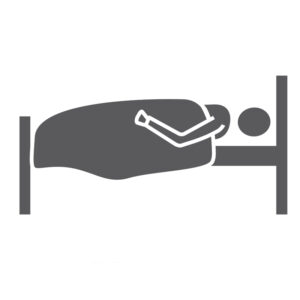
Immediate Care
Not Recommended
Using electronics
Driving
Drinking Alcohol
Taking non-steroidal anti-inflammatories (aspririn, ibuprofen)
After 12 Days
Vestibular Therapy
Reduce Dizziness, Regain Balance
PT’s that are trained in vestibular therapy assess your equilibrium by testing your vestibular, visual and muscular systems to find the root cause of the problem. They come up with an appropriate treatment plan to help reduce or eliminate the dizziness you may be experiencing, as well as restore balance and confidence in your movement to help reduce the risk of falling.
Vestibular therapy can help those suffering from:
- Vertigo
- Post-Concussion Syndrome
- Weakness in the lower extremities
-
BPPV
-
Dizziness
-
Imbalance
-
Cervicogenic dizziness
-
History of Falls
-
Fear of falling
-
Gait Impairment
- Vestibular Neuritis
Treatment for conditions includes:
- Epley Maneuver
- Gaze stabilization
- Proprioceptive retraining
- Oculomotor strengthening
- Habituation Training
- Compensatory strategies for safety
- Gait training
- Endurance training
- Transitional movement training
- Return to hobbies and normal ADLs
- Home program development
Balance Terms:
a sensory system that provides sense of balance and spatial orientation for the coordination of movement and balance. This system is divided between the brain and the inner ear.
Abbreviated BPPV: A condition in which otoconia is displaced into the semi-circular canals of the inner ear. This causes the sensation of vertigo (the sensation of spinning).
Small calcium carbonate crystals that are housed within part of the inner ear. They help us sense acceleration and gravity.
A series of head positioning maneuvers that help to reposition the “crystals” of the inner ear. This is a widely successful treatment for those suffering with BPPV.

